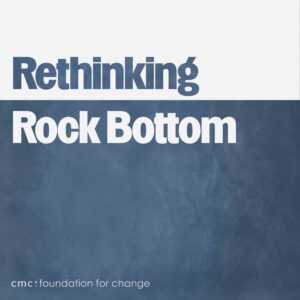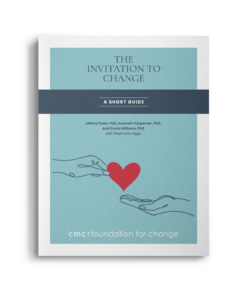
A New CMC:FFC Podcast
Join hosts Dr. Carrie Wilkens and Rev. Jan Brown in this 6-part series as they explore the complicated, and often life-altering, experience of loving someone struggling with substance use. Jan and Carrie will provide ways to approach the helping process that are grounded in the latest science, and their guests will share how real change happens for a family and the community around them.
Rethinking Rock Bottom sheds light on the impact shame and stigma have on those struggling and the people who care about them, and provides insights that can help everyone involved find the belonging they need. Check it out at the links below or wherever else you get your podcasts!

Episode 1: Focusing on Self-Awareness
with Julie Merberg
In Episode 1 we meet Julie, a NYC based mom who reflects on how learning that her son’s anxiety, shame, and pain were hidden motivators to his substance use opened the door for her to find more ways to support and help him reduce his substance use. She discusses remaining connected and reimagining what a healthy life looks like for her son–with thoughtful ITC insight from Jan and Carrie.

Episode 2: The Sibling Perspective
with Meg and Stephen
Even though siblings often notice substance use before the rest of the family, as peers they lack the tools and perspective to fully recognize what’s happening – and including parents can feel like a betrayal.
On this episode of “Rethinking Rock Bottom,” hosts Dr. Carrie Wilkens and Reverend Jan M. Brown welcome Meg and Stephen, siblings who were very close and then grew apart as substance use played an increasingly complicated role in their relationship. Together they highlight the struggles of Stephen’s substance use, the secrets and burdens that Meg felt she had to carry alone, and why she, as a sibling, did not fully understand or appreciate her role in Stephen’s healing journey – landing on the hope they have found in their relationship as they have each healed.

Episode 3: Grief & Self-Compassion
with Becky
Warning: This episodes discusses the loss of a child due to a substance related death.
When Becky’s daughter Katie began struggling with substances, Becky was repeatedly told by friends, family and professionals to disconnect and let her hit rock bottom. Scared and confused, Becky reluctantly agreed, despite how painful and unnatural it felt. She eventually changed tactics and began rebuilding a relationship with Katie. And though Katie ultimately lost her life to substances, Becky’s choice gave them both a chance to reconnect.
On this episode of “Rethinking Rock Bottom,” Becky shares with us how being connected to others allowed her to persist in connecting with her daughter, how she allowed herself to love herself and her daughter in spite of so much heartache, and how her connection with Katie lives on even through Katie’s passing.
“Nothing may take away one’s grief, as it is hoped nothing can take away one’s love.”

Episode 4: Hitting the Pause Button
with Dave and Tina
“We can’t climb inside their heads and take over the controls and steer them away from their drugs, but we can be the reason they choose recovery.”
This episode we speak with Dave and Tina, parents whose son, Craig, struggled with his mental health from a young age. As he got older, substances entered the picture as well.
When Dave and Tina tried to help, they found themselves ping-ponging between worlds. Addiction providers told them that their son needed mental health support, while the mental health programs said he needed to treat his substance use issues first. All of this left Dave and Tina floundering as they desperately tried to help their son.
Dave and Tina eventually found a different approach (a combination of CRAFT and the ITC) which helped them learn communication skills and positive reinforcement strategies to help their son and keep their family connected.

Episode 5: Race and Substance Use
with Felicia Pullen
“When we start attending to our wounds, our need to self-medicate the pain lessens, and the healing can finally begin.”
On this episode, we talk with Dr. Felecia Pullen, the founder, President, and CEO of Pillars and Let’s Talk SAFETY, Inc.
In her life and work, Felecia encourages a view of substance use that acknowledges its complex realities, with overlapping lenses of race, class, culture, and systemic injustice. This conversation highlights the challenges people of color face in treatment and brings to light the very real and painful impact of systemic racism and generational trauma.
Race continues to be a blind spot in the treatment community, but acknowledging these issues is essential for effectively treating communities of color.

Episode 6: A Drive for Compassion
with Jan and Carrie
“We are hopeful every day and are rewarded by seeing the people we work with make small daily changes and over time, deeply meaningful life changes.”
Treatment providers spend significant amounts of time having vulnerable conversations with people but rarely share their own stories.
On this final episode of the first season of Rethinking Rock Bottom, hosts Dr. Carrie Wilkens and Reverend Jan M. Brown take the opportunity to share their own experiences and some of the personal reasons that they are so passionate about helping families heal. They each navigated very different paths that led to their work of helping people heal, and their deeply personal reasons keep them both motivated to do this important work.
Together they each share their journey to CMC:Foundation for Change, the struggles and realizations they encountered along the way, and how hope has led them to serving and supporting others as they navigate their own paths toward healing.
